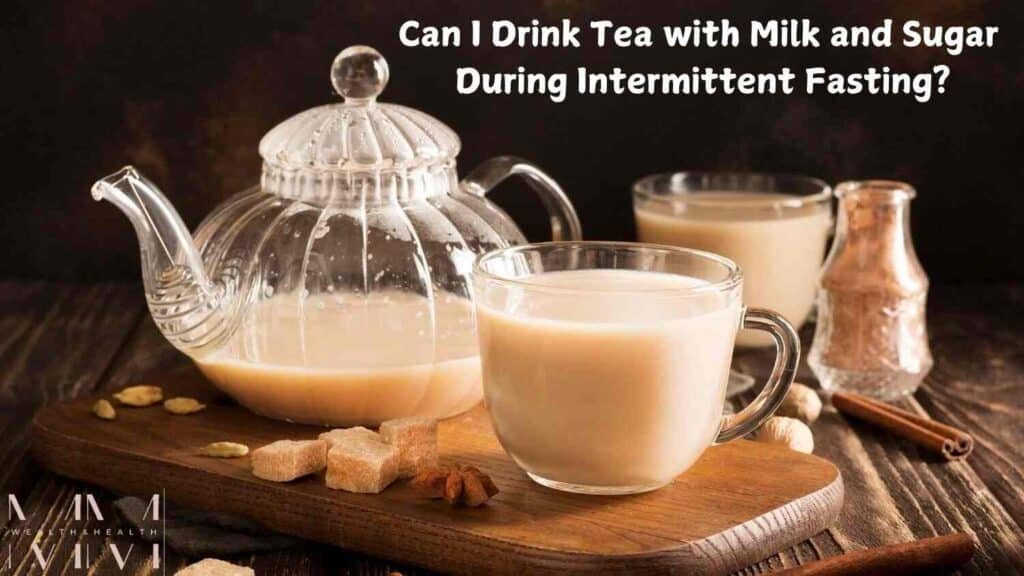Introduction
Intermittent fasting has surged in popularity in recent years as a powerful tool for weight management and improving overall health. But when it comes to beverages like tea, the question arises: Can you drink tea with milk and sugar during intermittent fasting? Let’s explore this common query in detail, uncover the science behind fasting, and provide actionable tips to help you make informed decisions.
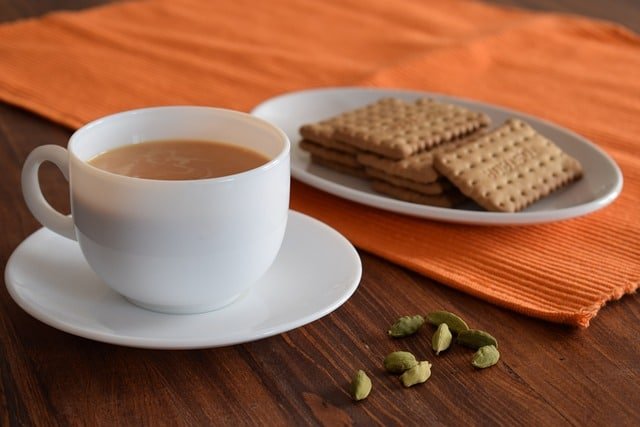
What Is Intermittent Fasting?
Intermittent fasting (IF) is an eating pattern that alternates between periods of fasting and eating. It’s not a diet but rather a structured approach to when you eat. Common methods of intermittent fasting include:
Time-Restricted Eating: Eating within an 8-hour window and fasting for the remaining 16 hours.
Alternate-Day Fasting: Alternating between fasting days and regular eating days.
5:2 Diet: Eating normally for five days a week and restricting calorie intake on two non-consecutive days.
The benefits of intermittent fasting include:
Weight Loss: Helps reduce calorie consumption and promotes fat burning.
Improved Insulin Sensitivity: Enhances the body’s response to insulin, reducing the risk of insulin resistance and type 2 diabetes.
Metabolic Health: Supports better energy levels and reduces oxidative stress.
Potential Protection Against Diseases: This may lower the risk of heart disease, Alzheimer’s disease, and other chronic conditions.
The Role of Beverages During Fasting
During the fasting period, it is important to remain fast, which allows the body to shift from using glucose to utilizing fat for energy. Certain beverages can disrupt this process by:
– Causing spikes in blood sugar levels
– Triggering the release of insulin
– Increasing overall calorie intake
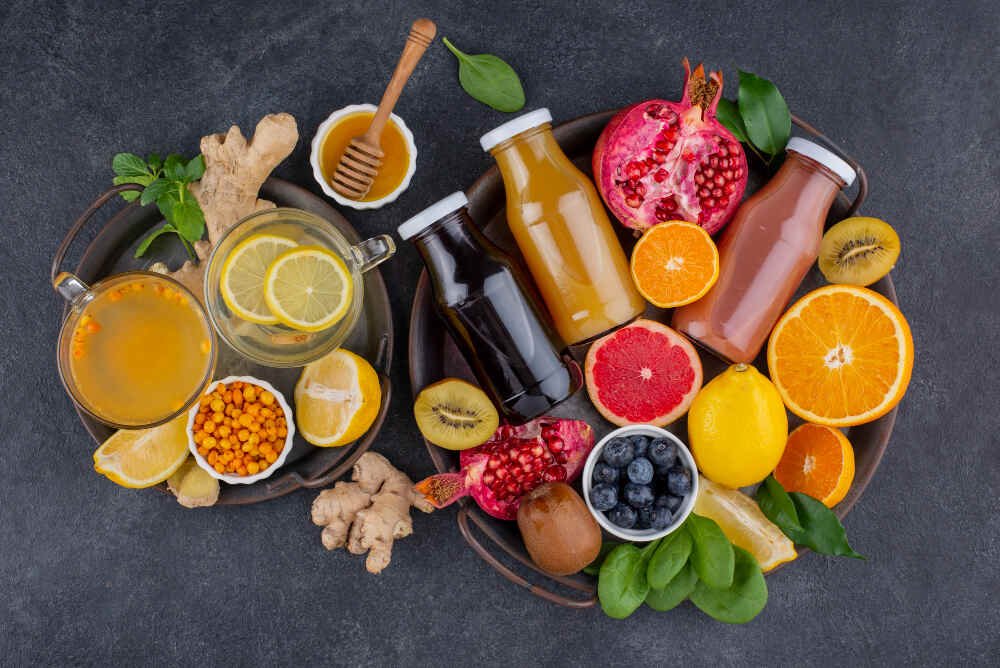
To preserve the benefits associated with fasting, consuming drinks like teas that are either zero-calorie or very low in calories is advisable. Some suitable options include:
– Black Coffee: This beverage contains no calories and can enhance energy levels while promoting fat burning.
– Green Tea: It is a popular drink, known for boosting metabolism and providing significant antioxidant benefits and other numerous health benefits.
– Herbal Teas: Varieties like chamomile tea, ginger tea, and oolong tea are excellent choices for aiding digestion and curbing hunger.
– Water: Staying well-hydrated is essential for optimal bodily functions.
– Diluted Apple Cider Vinegar: This option may aid in controlling blood sugar levels and supporting gut health.
By selecting the right beverages during fasting, individuals can effectively maintain their fasting state and maximize the associated benefits.
Can I drink tea with milk and sugar during intermittent fasting?
Intermittent fasting allows for the consumption of tea; however, it’s important to avoid adding sugar, milk, or honey. These additions can break your fast by introducing calories, which diminishes the benefits associated with fasting. Additionally, artificial sweeteners are not advisable, as they may heighten sugar cravings. Instead, you can enjoy plain loose tea leaves or tea brewed from tea bags in water during fasting periods.
While milk has been a beloved dietary staple due to its rich nutritional content, it may not be the best choice during intermittent fasting. The presence of calories and potential sugars in milk can interfere with fasting protocols and insulin levels. Therefore, understanding how milk affects fasting can help you maintain your fasting goals more effectively.
Does Milk Break a Fast? The Science Behind It
Let’s get straight to the point – yes, milk breaks fast. But why? It all comes down to its composition. Milk contains natural sugars (lactose) and calories, both of which can disrupt the fasting state. When you consume milk, your body releases insulin to manage the rise in blood sugar levels. This insulin response shifts your body from fat-burning mode to energy-storage mode, which directly undermines one of fasting’s primary goals: fat loss.
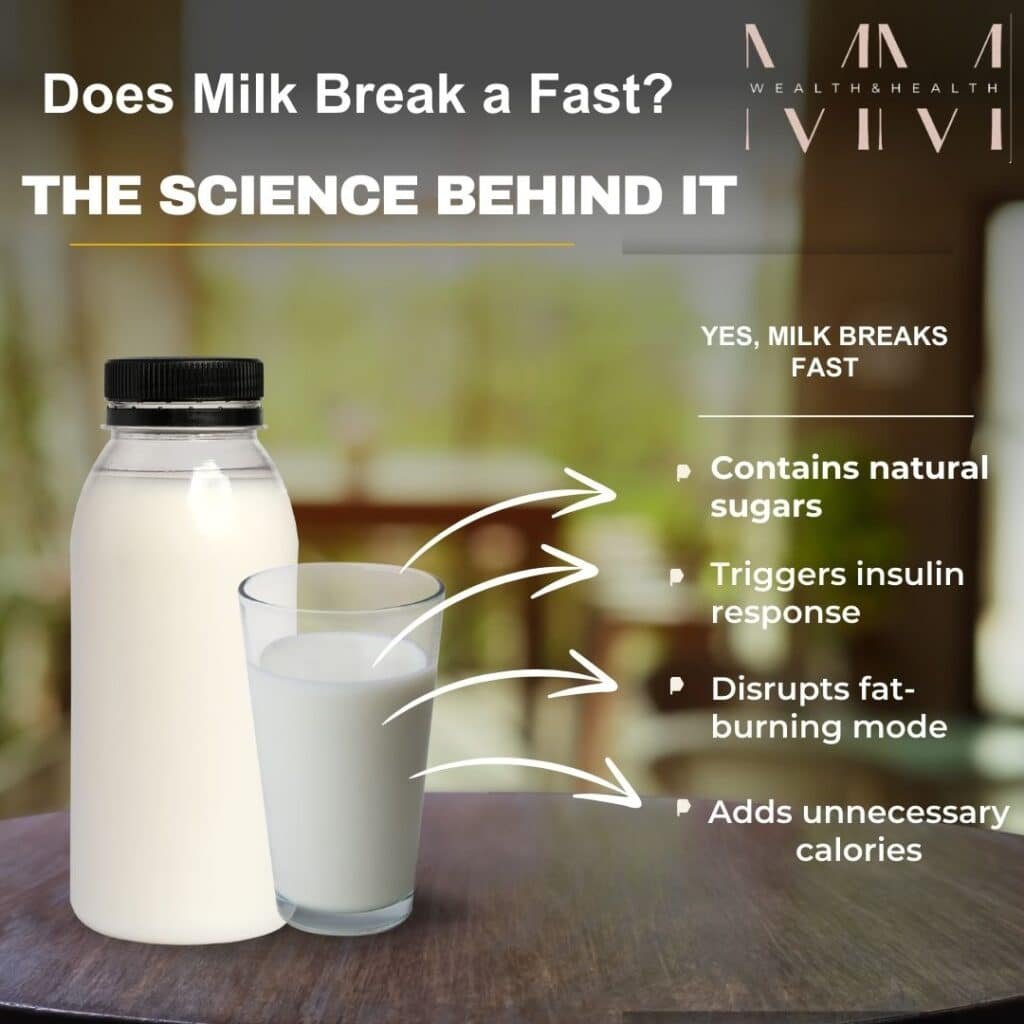
Even a small amount of milk can interfere if you’re fasting for metabolic health, weight loss, or insulin sensitivity. For example, just one cup of whole milk contains about 150 calories and 12 grams of sugar (lactose). That’s enough to kick you out of the fasting zone. So, if you’re serious about fasting, it’s best to skip the milk entirely.
How Does Milk Affect Digestion During Fasting?
Milk isn’t exactly a digestion superhero, especially during a fast. For starters, if you’re lactose intolerant, milk can lead to bloating, gas, or even diarrhea, making your fasting experience far from pleasant. But even if you tolerate lactose well, milk proteins like casein can slow down digestion. This can leave you feeling sluggish and heavy instead of light and energized, which is the opposite of how you want to feel during a fast.
It is good to understand that, fasting is supposed to give your digestive system a break. Adding milk, which requires effort to digest, can counteract that benefit. So, if you’re fasting for gut health or simplicity, milk might not be your best ally.
Does Milk Interfere with Autophagy?
Autophagy is one of the most fascinating benefits of fasting. It’s your body’s way of cleaning out damaged cells and recycling them for energy, essentially a cellular detox. But here’s the catch: milk can interfere with this process.
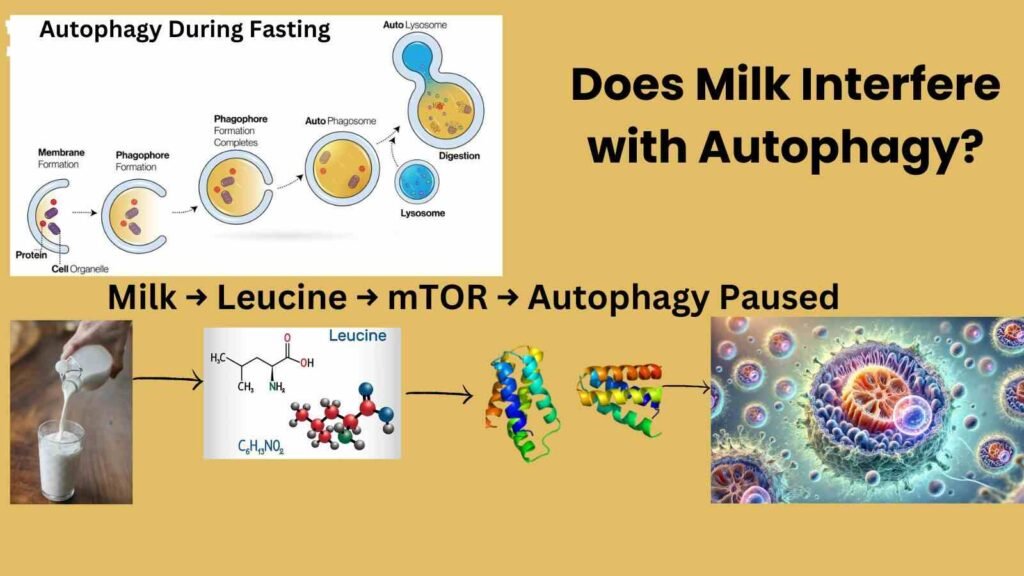
Milk contains leucine, an amino acid that activates a pathway called mTOR. When mTOR is activated, autophagy is put on pause. This means drinking milk could prevent your body from fully accessing the deeper benefits of fasting, like cellular repair, reduced inflammation, and anti-aging effects. If autophagy is your goal, it’s best to avoid milk altogether.
Can Milk Impact Hormone Balance While Fasting?
Milk isn’t just about calories and proteins; it also contains natural hormones like estrogen. When you consume milk, these hormones can influence your body’s hormonal balance. Elevated estrogen levels have been linked to weight gain, mood swings, and even certain health risks.
If you’re fasting to balance your hormones or improve overall health, milk might not be the best choice. While the impact varies from person to person, it’s worth considering whether milk aligns with your fasting goals.
What Can You Drink While Fasting? Zero or low-calorie beverage to Milk
If milk is off the table, what can you drink without breaking your fast? Don’t worry, there are plenty of fasting-friendly options to keep you hydrated and satisfied:
Water: Still, sparkling, or infused with a slice of lemon or cucumber, it’s the ultimate fasting drink.

Black Coffee: A cup of black coffee can boost focus and metabolism without adding calories. Just skip the cream and sugar!
Herbal Teas: Calorie-free and soothing, herbal teas like peppermint or chamomile are perfect for fasting. A simple herbal tea mixed with hot water is more than enough to start your day.
These options not only keep your fast intact but also support your overall fasting goals.
Is Plant-Based Milk Fasting-Friendly?
With the rise of plant-based diets, many people wonder if almond, coconut, or oat milk can fit into a fasting routine. The answer? It depends.
Unsweetened Almond or Coconut Milk: These are low in calories and sugar, making them a better option if you’re fasting. A small splash in your coffee or tea is unlikely to break your fast.
Oat or Rice Milk: These tend to be higher in natural sugars and calories, so they’re more likely to disrupt the effects of intermittent fasting.
Always check the label! Look for unsweetened, low-calorie options to minimize any insulin response.
Strict Fasting vs. Flexible Fasting – Can You Use Milk?
Your approach to fasting plays a big role in whether milk (or plant-based milk) is acceptable.
Strict Fasting: If you’re following a water fast or other strict protocols, avoid both dairy and plant-based milk entirely. Even small amounts can disrupt fasting benefits like fat loss and autophagy.
Flexible Fasting: For approaches like the 16:8 method, a splash of low-calorie plant-based milk might be acceptable. However, use it sparingly to ensure your fasting goals remain effective.
Can You Drink Unsweetened Tea While Fasting?
Absolutely! Unsweetened teas are a fasting superstar—calorie-free, flavorful, and packed with health benefits. Whether you’re fasting for weight loss, autophagy, or metabolic health, unsweetened teas can be your best companion. Here are some of the best options:
Green Tea: Known for its fat-burning properties, green tea boosts metabolism and supports overall health. It’s also rich in antioxidants like EGCG, which can enhance brain function and reduce inflammation.
Black Tea: A robust, energizing option that’s loaded with antioxidants. It’s perfect for keeping you alert during your fasting window.

Herbal Teas: From calming chamomile to digestion-boosting ginger tea, herbal teas are versatile and fast-friendly. They can also help curb hunger pangs and promote relaxation.
White Tea: Mild, refreshing, and low in caffeine, white tea is a gentle option packed with antioxidants.
These teas not only keep your fast intact but also provide additional health benefits, making them a win-win for fasting enthusiasts.
How Milk and Sugar Sabotage Your Fast
Let’s talk about why milk and sugar are fasting foes.
Milk
Even a small splash of milk can disrupt your fast. Here’s why:
Calories: Milk contains calories, which can break your fast. Just one tablespoon of whole milk has about 9 calories.
Insulin Spike: The lactose in milk raises blood sugar levels, triggering an insulin response. This pulls your body out of fat-burning mode.
Disrupted Autophagy: Milk proteins like casein and leucine can interfere with autophagy, the cellular cleanup process that’s a key benefit of fasting.
Sugar
Adding sugar to your tea is a big no-no if you’re fasting. Here’s what happens:
Blood Sugar Spike: Sugar causes a rapid rise in blood glucose, followed by an insulin surge.
Calorie Intake: Sugar adds empty calories, which can hinder weight loss and metabolic health goals.
Disrupted Fasting State: Even a small amount of sugar can pull your body out of the fasted state, making it harder to reap the benefits of fasting.
Best Practices for Drinking Tea During Fasting
To make the most of your fasting journey, follow these tips when enjoying tea:
Stick to Zero-Calorie Options: Unsweetened teas like green, black, or herbal varieties are your best bet.
Enhance Flavor Naturally: Add a slice of lemon, a cinnamon stick, or fresh ginger to your tea for a flavor boost without breaking your fast.
Stay Hydrated: Pair your tea with plenty of water to stay hydrated and reduce hunger pangs.
Avoid Artificial Sweeteners: Even though they’re calorie-free, some artificial sweeteners can trigger an insulin response, disrupting your fast.
Fasting Alternatives to Milk and Sugar
If you’re missing the creaminess or sweetness in your tea, try these fasting-approved alternatives:
Coconut Oil or MCT Oil: Adding a teaspoon to your black tea or coffee can provide a creamy texture and a quick energy boost without breaking your fast.
Bone Broth: While it contains minimal calories, bone broth is a nutrient-dense option for longer fasting periods. It’s rich in electrolytes and can help curb hunger.
Unsweetened Plant-Based Milk: A splash of unsweetened almond or coconut milk can work if you’re following a more flexible fasting approach. Just keep the quantity small to avoid disrupting your fast.
Why Fasting-Friendly Teas Are a Game-Changer
Adding unsweetened teas into your fasting routine offers a host of benefits:
Weight Loss Support: Teas like green tea and oolong tea boost fat oxidation and help with weight management. It is the best option which has zero calories.
Improved Insulin Sensitivity: Regular consumption of unsweetened teas can reduce the risk of insulin resistance and support better blood sugar control.
Enhanced Cognitive Function: Certain teas, like green tea, are linked to improved brain function and a reduced risk of neurodegenerative diseases.
Heart Health: Unsweetened teas are associated with a lower risk of cardiovascular disease and high blood pressure. Teas that have potential health benefits are an added advantage.
Metabolic Boost: Teas can increase energy levels and support the metabolic switch necessary for effective fasting.
A life-changing Amazon book!
If you are looking for a turning point in your life then explore the heartfelt guide crafted with real-life wisdom and genuine care, designed to help you rediscover your true potential. The author speaks directly to your struggles, offering not just advice, but a fresh perspective and practical tools to help you grow in ways you never thought possible. This book is like a trusted friend, cheering you on and showing you that change is not only possible, it’s within your reach. Don’t wait for the perfect moment, because the moment to begin your transformation is now. Open these pages and let this book be the gentle push you need to create the life you deserve.
1. Does Tea with Milk and Sugar Break Intermittent Fasting?
Yes, both milk and sugar breakfast. Milk contains calories, lactose, and proteins, triggering an insulin response that halts fat burning. Sugar spikes blood glucose and insulin levels, further disrupting fasting benefits like autophagy. Stick to plain black, green, or herbal teas for a true fast.
2. Can I Drink Almond or Coconut Milk During Intermittent Fasting?
Whether you can consume almond or soy milk during intermittent fasting depends on your fasting type and goals. While these plant-based options have fewer calories and a lower impact on blood sugar than dairy milk, they can still trigger an insulin response.
For strict fasting, avoid all types of milk, including plant-based alternatives. If following a flexible fasting approach (like 16:8), a small splash of unsweetened almond or coconut milk may be acceptable but should be kept minimal to maintain fasting benefits.
3. What Can I Drink Instead of Tea with Milk and Sugar During Fasting?
Opt for fasting-friendly, zero-calorie beverages:
✅ Black Tea & Green Tea – Boosts metabolism and provides antioxidants.
✅ Herbal Teas (Chamomile, Peppermint, Ginger) – Supports digestion and curbs hunger.
✅ Black Coffee – Enhances fat burning and mental focus.
✅ Water (Still or Sparkling) – Essential for hydration.
4. Does Milk Affect Weight Loss and Insulin Sensitivity During Fasting?
Yes. Milk contains lactose (sugar) and proteins, which increase blood glucose and insulin levels, shifting the body from fat-burning to energy-storage mode. If fasting for weight loss or insulin regulation, skip milk and choose water, tea, or black coffee to maintain the fast.
5. What Happens to Autophagy If I Drink Milk While Fasting?
Milk halts autophagy, the body’s cellular repair and detox process, due to proteins like casein and leucine, which activate the mTOR pathway. If fasting for anti-aging, inflammation reduction, or cellular health, avoid milk to fully benefit from autophagy.
6. How Can I Make Tea Taste Better Without Breaking My Fast?
Enhance tea naturally with zero-calorie options:
✅ Lemon or Lime – Adds a citrusy kick.
✅ Cinnamon – Sweetens tea and regulates blood sugar.
✅ Fresh Ginger – Aids digestion and adds warmth.
✅ Peppermint Leaves – Refreshing and other digestion.
✅ Himalayan Salt – Balances electrolytes (great for longer fasts).
Avoid honey, sugar, milk, and artificial sweeteners to stay fast.
Conclusion – Skip the milk, sip the tea
When practicing intermittent fasting, it’s advisable to avoid beverages such as tea with milk and sugar during your fasting window. Instead, consider choosing zero-calorie options, including black tea, green tea, and herbal tea. These drinks can help you maintain the fasted state while contributing to weight loss, enhancing metabolic health, and promoting overall well-being.

Intermittent fasting offers a flexible and sustainable approach to improving health. By being mindful of what you consume during the fasting period, you can fully harness its potential and experience its various health benefits.
Consistency and informed choices are key, and opting for fasting-friendly teas can be an excellent way to support your journey toward better health.

